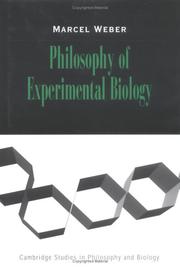| Listing 1 - 10 of 31 | << page >> |
Sort by
|

ISBN: 3110158930 130627155X 3110800195 9783110158939 Year: 2011 Volume: 45 Publisher: Berlin ; Boston : De Gruyter,
Abstract | Keywords | Export | Availability | Bookmark
 Loading...
Loading...Choose an application
- Reference Manager
- EndNote
- RefWorks (Direct export to RefWorks)
Evolution --- Evolution (Biology) --- Evolution. --- Evolution (Biology). --- Animal evolution --- Animals --- Biological evolution --- Darwinism --- Evolutionary biology --- Evolutionary science --- Origin of species --- Biology --- Biological fitness --- Homoplasy --- Natural selection --- Phylogeny --- Philosophy --- Creation --- Emergence (Philosophy) --- Teleology

ISBN: 0521829453 0521143446 1107147808 9786610540808 0511215312 0511217102 0511315724 0511498594 128054080X 0511211732 0511213506 9780511217104 0511208154 9780511208157 9780511215315 9780511498596 9780511213502 9780511211737 9780521829458 9781107147805 6610540802 9780511315725 Year: 2005 Publisher: Cambridge Cambridge University press
Abstract | Keywords | Export | Availability | Bookmark
 Loading...
Loading...Choose an application
- Reference Manager
- EndNote
- RefWorks (Direct export to RefWorks)
Philosophy of Experimental Biology explores some central philosophical issues concerning scientific research in experimental biology, including genetics, biochemistry, molecular biology, developmental biology, neurobiology, and microbiology. It seeks to make sense of the explanatory strategies, concepts, ways of reasoning, approaches to discovery and problem solving, tools, models and experimental systems deployed by scientific life science researchers and also integrates developments in historical scholarship, in particular the New Experimentalism. It concludes that historical explanations of scientific change that are based on local laboratory practice need to be supplemented with an account of the epistemic norms and standards that are operative in science. This book should be of interest to philosophers and historians of science as well as to scientists.
Biology, Experimental --- Philosophy. --- Experimental biology --- Biology --- Philosophy --- Experiments --- Arts and Humanities --- Philosophy of science
Book
ISBN: 1108954189 1009184156 1108957536 1108957730 Year: 2022 Publisher: Cambridge : Cambridge University Press,
Abstract | Keywords | Export | Availability | Bookmark
 Loading...
Loading...Choose an application
- Reference Manager
- EndNote
- RefWorks (Direct export to RefWorks)
The history of developmental biology is interwoven with debates as to whether mechanistic explanations of development are possible or whether alternative explanatory principles or even vital forces need to be assumed. In particular, the demonstrated ability of embryonic cells to tune their developmental fate precisely to their relative position and the overall size of the embryo was once thought to be inexplicable in mechanistic terms. Taking a causal perspective, this Element examines to what extent and how developmental biology, having turned molecular about four decades ago, has been able to meet the vitalist challenge. It focuses not only on the nature of explanations but also on the usefulness of causal knowledge - including the knowledge of classical experimental embryology - for further scientific discovery. It also shows how this causal perspective allows us to understand the nature and significance of some key concepts, including organizer, signal and morphogen. This title is also available as Open Access on Cambridge Core.
Developmental biology --- Philosophy. --- Biology --- Growth --- Ontogeny --- Development (Biology)
Book
ISBN: 1108949355 Year: 2022 Publisher: Cambridge University Press
Abstract | Keywords | Export | Availability | Bookmark
 Loading...
Loading...Choose an application
- Reference Manager
- EndNote
- RefWorks (Direct export to RefWorks)
Book
ISBN: 9781108954181 9781009184151 9781108949354 Year: 2022 Publisher: Cambridge Cambridge University Press
Abstract | Keywords | Export | Availability | Bookmark
 Loading...
Loading...Choose an application
- Reference Manager
- EndNote
- RefWorks (Direct export to RefWorks)
Book
Year: 1963 Publisher: Zürich Altorfer
Abstract | Keywords | Export | Availability | Bookmark
 Loading...
Loading...Choose an application
- Reference Manager
- EndNote
- RefWorks (Direct export to RefWorks)
Book
Year: 1963 Publisher: Zurich Université de Zurich
Abstract | Keywords | Export | Availability | Bookmark
 Loading...
Loading...Choose an application
- Reference Manager
- EndNote
- RefWorks (Direct export to RefWorks)
Book
Year: 2022 Publisher: Cambridge, England : Cambridge University Press,
Abstract | Keywords | Export | Availability | Bookmark
 Loading...
Loading...Choose an application
- Reference Manager
- EndNote
- RefWorks (Direct export to RefWorks)
Book
Year: 1963 Publisher: Zurich : O. Altorfer,
Abstract | Keywords | Export | Availability | Bookmark
 Loading...
Loading...Choose an application
- Reference Manager
- EndNote
- RefWorks (Direct export to RefWorks)
Book
Year: 2022 Publisher: Cambridge, England : Cambridge University Press,
Abstract | Keywords | Export | Availability | Bookmark
 Loading...
Loading...Choose an application
- Reference Manager
- EndNote
- RefWorks (Direct export to RefWorks)
| Listing 1 - 10 of 31 | << page >> |
Sort by
|

 Search
Search Feedback
Feedback About UniCat
About UniCat  Help
Help News
News